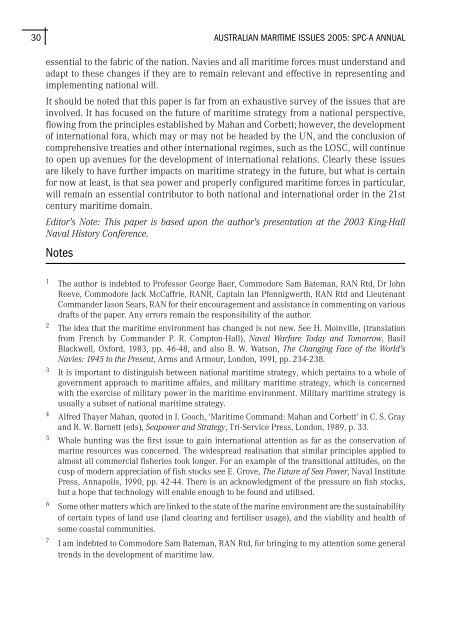Australian Maritime Issues 2005 - Royal Australian Navy
Australian Maritime Issues 2005 - Royal Australian Navy
Australian Maritime Issues 2005 - Royal Australian Navy
Create successful ePaper yourself
Turn your PDF publications into a flip-book with our unique Google optimized e-Paper software.
30<br />
AUSTRALIAN MARITIME ISSUES <strong>2005</strong>: SPC-A ANNUAL<br />
essential to the fabric of the nation. Navies and all maritime forces must understand and<br />
adapt to these changes if they are to remain relevant and effective in representing and<br />
implementing national will.<br />
It should be noted that this paper is far from an exhaustive survey of the issues that are<br />
involved. It has focused on the future of maritime strategy from a national perspective,<br />
flowing from the principles established by Mahan and Corbett; however, the development<br />
of international fora, which may or may not be headed by the UN, and the conclusion of<br />
comprehensive treaties and other international regimes, such as the LOSC, will continue<br />
to open up avenues for the development of international relations. Clearly these issues<br />
are likely to have further impacts on maritime strategy in the future, but what is certain<br />
for now at least, is that sea power and properly configured maritime forces in particular,<br />
will remain an essential contributor to both national and international order in the 21st<br />
century maritime domain.<br />
Editor’s Note: This paper is based upon the author’s presentation at the 2003 King-Hall<br />
Naval History Conference.<br />
Notes<br />
1 The author is indebted to Professor George Baer, Commodore Sam Bateman, RAN Rtd, Dr John<br />
Reeve, Commodore Jack McCaffrie, RANR, Captain Ian Pfennigwerth, RAN Rtd and Lieutenant<br />
Commander Jason Sears, RAN for their encouragement and assistance in commenting on various<br />
drafts of the paper. Any errors remain the responsibility of the author.<br />
2 The idea that the maritime environment has changed is not new. See H. Moinville, (translation<br />
from French by Commander P. R. Compton-Hall), Naval Warfare Today and Tomorrow, Basil<br />
Blackwell, Oxford, 1983, pp. 46-48, and also B. W. Watson, The Changing Face of the World’s<br />
Navies: 1945 to the Present, Arms and Armour, London, 1991, pp. 234-238.<br />
3 It is important to distinguish between national maritime strategy, which pertains to a whole of<br />
government approach to maritime affairs, and military maritime strategy, which is concerned<br />
with the exercise of military power in the maritime environment. Military maritime strategy is<br />
usually a subset of national maritime strategy.<br />
4 Alfred Thayer Mahan, quoted in J. Gooch, ‘<strong>Maritime</strong> Command: Mahan and Corbett’ in C. S. Gray<br />
and R. W. Barnett (eds), Seapower and Strategy, Tri-Service Press, London, 1989, p. 33.<br />
5 Whale hunting was the first issue to gain international attention as far as the conservation of<br />
marine resources was concerned. The widespread realisation that similar principles applied to<br />
almost all commercial fisheries took longer. For an example of the transitional attitudes, on the<br />
cusp of modern appreciation of fish stocks see E. Grove, The Future of Sea Power, Naval Institute<br />
Press, Annapolis, 1990, pp. 42-44. There is an acknowledgment of the pressure on fish stocks,<br />
but a hope that technology will enable enough to be found and utilised.<br />
6 Some other matters which are linked to the state of the marine environment are the sustainability<br />
of certain types of land use (land clearing and fertiliser usage), and the viability and health of<br />
some coastal communities.<br />
7 I am indebted to Commodore Sam Bateman, RAN Rtd, for bringing to my attention some general<br />
trends in the development of maritime law.

















